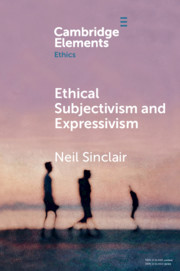Element contents
Ethical Subjectivism and Expressivism
Published online by Cambridge University Press: 14 August 2020
Summary
- Type
- Element
- Information
- Series: Elements in EthicsOnline ISBN: 9781108581134Publisher: Cambridge University PressPrint publication: 10 September 2020
References
- 15
- Cited by

